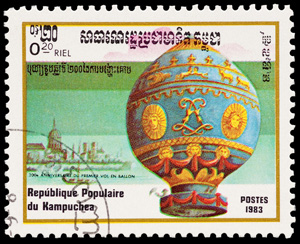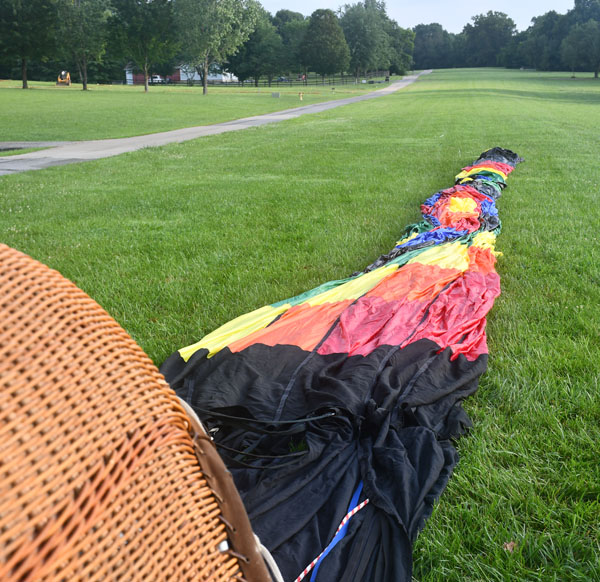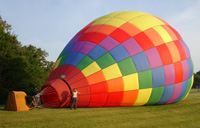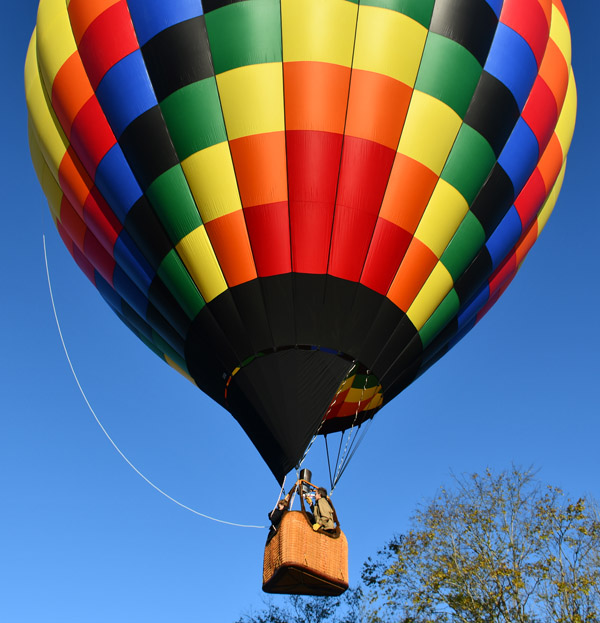
| Home |
| Meet Your Pilot |
| Ballooning History |
| Gift Certificate |
| Pricing & Services |
| Schedule a Flight |
Hot Air Ballooning History
Hot air balloons are the oldest form of manned flight. The first aerostat was developed by two French brothers, Joseph and Etienne Montgolfier back in the late 1700's. The brothers presumed that the smoke from a fire would cause ashes to rise rather than the heat so they built a light weight sphere that would capture this "magical smoke" and floated it into the air. In further testing, the Montgolfier brothers launched this paper sphere with a basket that carried a duck, a rooster and a sheep. All returned safely to Earth. This proved that higher altitudes were breathable and led the way to manned flight. Once perfected, they demonstrated their invention to King Louis XVI at Versailles, France. The first manned flight took place in November 1783. Hot Air and Champange Steeped in Tradition
In the olden days of Europe, pilots frequently flew over rural areas where people had never heard of, let alone seen, one of these aerostats. In 1783, a group of farmers saw an unmanned craft descend upon them from "outer space". Not knowing what this creature was, they attacked it with pitch forks and dragged it behind a horse to ensure it was dead. Needless to say, such activity was rough on the equipment of the day. Pilots, being resourceful, quickly adopted the practice of carrying a bottle of wine on board during a flight to pacify angry farmers. This custom is still followed today. As a beverage reserved for festive occasions, champagne, is traditionally offered at the end of a flight. Wicker and Suede

The advent of powered flight in the early 1900's soon outmoded balloons. Not until the 1960's did their popularity re-emerge when fire retardant, rip-stop nylon fabric and propane powered burners became available. Surprisingly though, gondolas are still made out of the same materials they were made from many years ago, wicker and suede. Synthetic materials cannot match the combination of strength, impact resistance, low weight, non-conductivity and reasonable cost. Today's gondolas matched with strong, light weight fabrics and efficient fuel systems make this a very safe and reliable sport. 
The envelope holds a big bubble of warm air that rises in its cooler surroundings. Flights begin by blowing cold air into the envelope with a gas powered fan. This air is heated with propane fuel fed through the burner system. The hot air expands the fabric to its full bulbous shape. Further heating carries passengers aloft. Pilots have no steering mechanism but instead use the wind for their direction. They can change direction by changing altitude. The amount of directional change varies with weather conditions. To ascend, air inside the envelope is heated. To descend, the air cools or is vented.  When aloft, you travel with the wind and don't feel it blowing! It's a very smooth
and quiet experience except for the occasional sound of the burner. The best weather for
flying is a clear, temperate day with light winds. These conditions
usually occur just after sunrise or 1-2 hours before sunset. Flights
are planned in the early morning or late afternoon to take advantage of
these good weather conditions.
When aloft, you travel with the wind and don't feel it blowing! It's a very smooth
and quiet experience except for the occasional sound of the burner. The best weather for
flying is a clear, temperate day with light winds. These conditions
usually occur just after sunrise or 1-2 hours before sunset. Flights
are planned in the early morning or late afternoon to take advantage of
these good weather conditions.
Part of the allure and fun of ballooning is not knowing exactly where the landing site will be. Flights usually cover 5-10 miles from the take off point and last about an hour. We have a ground crew that follows us and remains in radio contact throughout the duration of the flight. Seeking permission to take off or land in someone's yard is a wonderful opportunity to meet people and share the sport. Certified as lighter-than-air aircraft, balloons require a pilot's license to operate. Pilots must pass a written test, meet all FAA requirements for certification and pass a flight test with an examiner. If you are interested in learning how to fly please let us know. We are certified to instruct and can offer pilot training in hot air balloons and single engine airplanes. |
